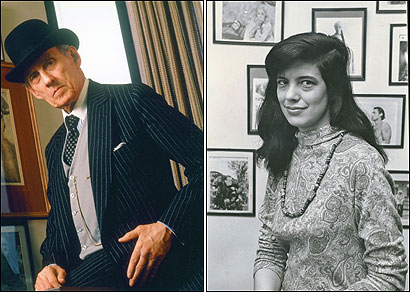
Susan Sontag
Photo credit/copyright: Annie Leibovitz,
courtesy of the artist
The literary giant Susan Sontag was determined to beat the cancer that claimed her. Now her son tells the story of her final struggle, and opens her private papers to reveal intimate secrets about her life
Susan Sontag burst upon the 1960s in a blaze of black hair, black eyes, passion and intellectual potency – the ultimate babe with brains. An exceptional essayist, she challenged accepted cultural wisdom and was particularly brilliant on how photography changes the way we think about the past and present. For her, cameras and celebrity held no fear, and her image was captured by the most avant-garde and distinguished photographers. Before their lenses she is beautiful, haunting: sculpted face, strong body.

Philip Rieff (left) and Susan Sontag in 1966. (Reprinted with permission of Insight Magazine. Copyright 2004. Newsworld Communications. All rights reserved. Photo by Brig Cabe (left); Tony Rollo / Newsweek)
This is a story about a woman who lived an epic life and who, in death, still holds power over those who loved her. Long before Sontag became an academic amazon, before others adopted her as an icon, she had been a frightened, asthmatic little girl, abandoned by her alcoholic mother and pregnant at 19. Fleeing the older husband she married within days of meeting him – the sociologist Philip Rieff – she made her way to New York to begin her writing career and bring up their son alone. He, somehow, often gets written out of the details of her life. His name is David Rieff and he has written a book about her painful death. In it he attempts to be truthful about living with the dying Sontag, about universal life-and-death dilemmas. Yet the reader is left wondering why he wrote it; puzzling over what those who loved Sontag believed was right to publish about her private pain. Could capturing her in death have become a way for both her son and her lover to possess her, finally, in a way that wasn’t possible in life?
No comments:
Post a Comment